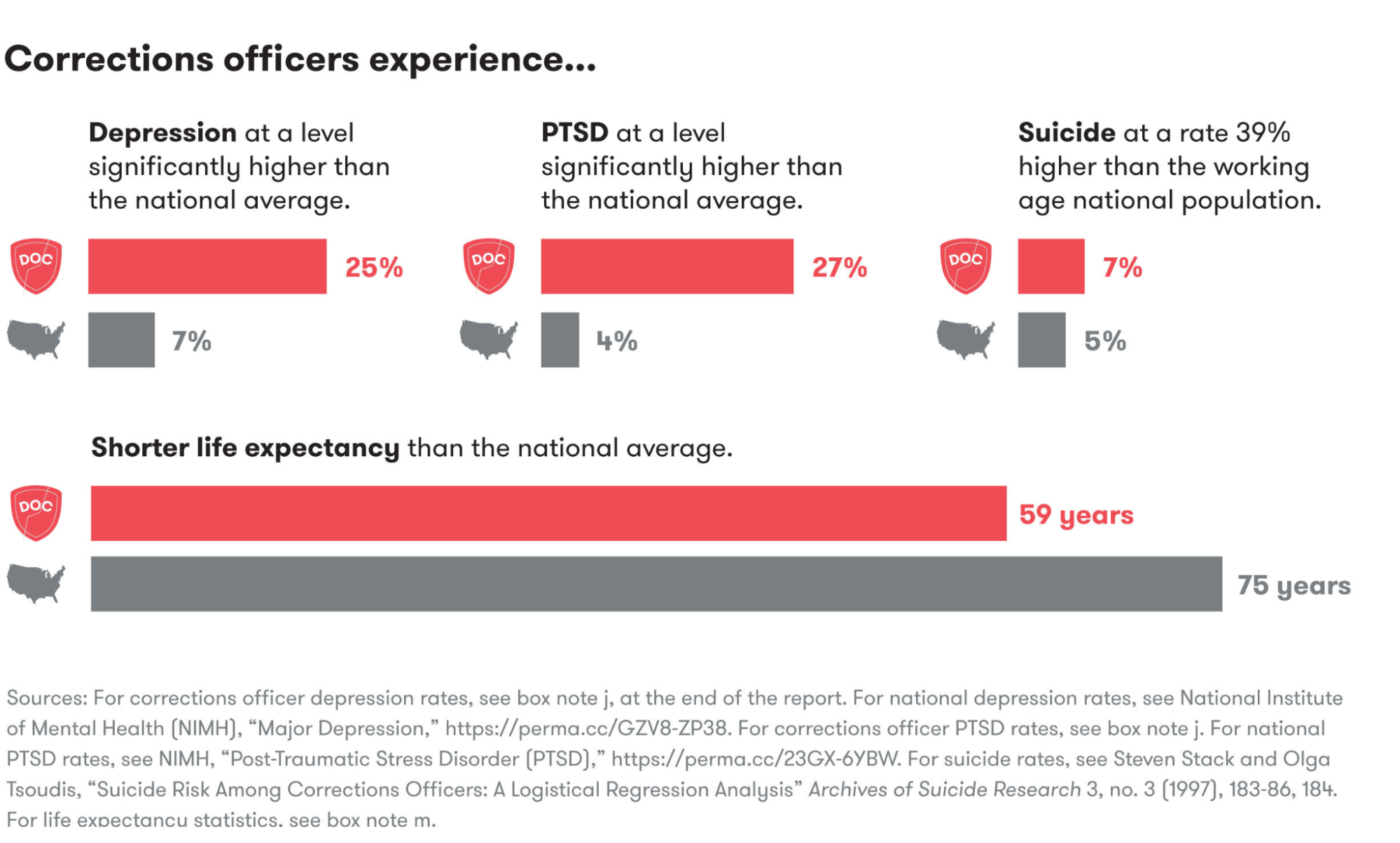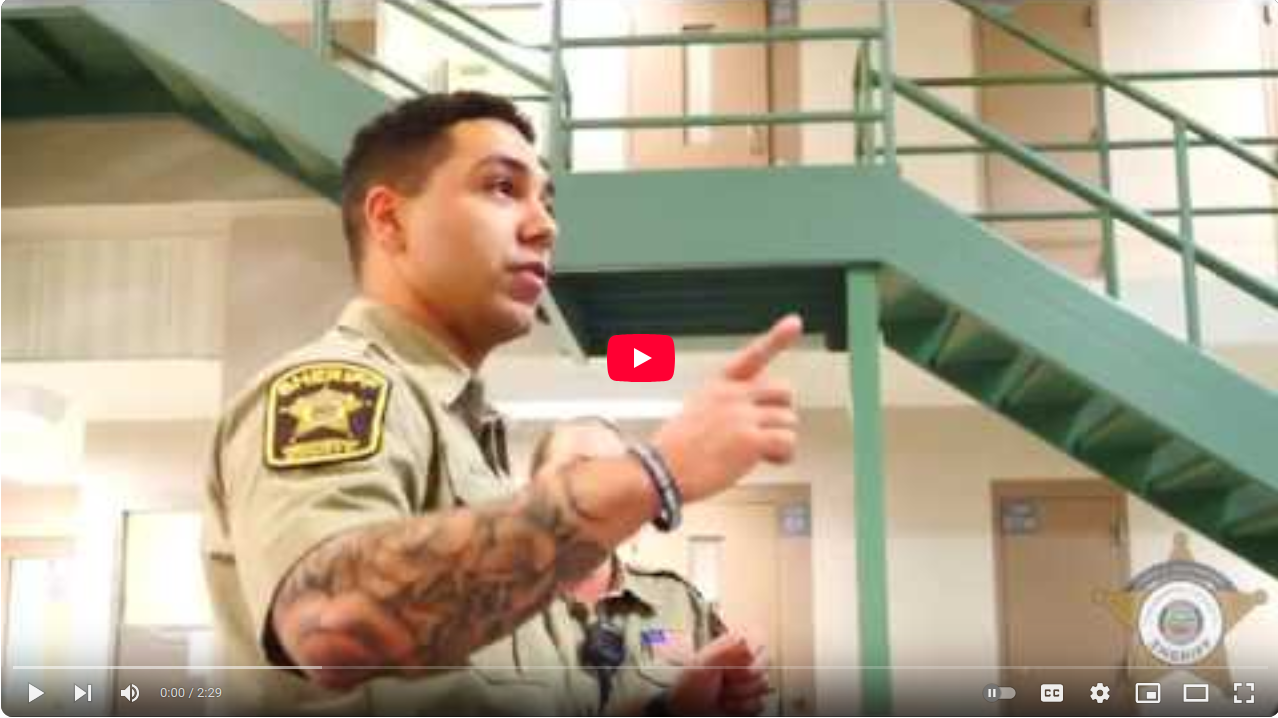8.10 Careers in Corrections: Corrections Officer
The most common career opportunity within Corrections is the Corrections Officer, although there are Security Aides, Correctional Counselors, Programming Specifications, and other administrative positions within the field as well. In many states, the Corrections Officer is a sworn officer trained and certified by the state and tasked with everything from maintaining the daily routine and safety and security of the facility and individuals housing within it to role modeling and mentoring those in their care.
Being a corrections deputy is a challenging and potentially dangerous job. These professionals face a variety of risks, including violence from those in custody and the mental strain of working in a high-stress environment. According to the Bureau of Labor Statistics, the fatality rate for corrections officers is higher than the national average, with an average of 15.7 deaths per 100,000 full-time equivalent workers in 2019. This reflects the dangers inherent in working in close quarters with individuals who may be violent or unpredictable. In addition to the physical dangers, corrections deputies also face mental health challenges.
The people who work inside prisons are largely responsible for the environment that is created behind the walls. Although corrections staff may not dictate standards and policies, they must interpret them and put them into practice. This takes its own toll. Corrections officers, who work inside these facilities for 40 or more hours per week over the course of 20 or more years, are also subject to the restrictive nature of prison and the negative effects that has on mental health. Researchers have only recently begun to examine the psychosocial effects of working in prison on corrections officers, but early studies show that officers suffer from PTSD and die by suicide at rates much higher than law enforcement staff in other agencies and those in the military.
The nature of the work, including long hours, exposure to trauma, and the need to maintain constant vigilance, can lead to high levels of stress, anxiety, and depression. Corrections deputies may also struggle with burnout, as the demands of the job can be emotionally draining. These factors can take a toll on the mental health of corrections deputies, leading to increased rates of depression, post-traumatic stress disorder (PTSD), and suicide. Overall, being a corrections deputy is a demanding and potentially dangerous job that requires a high level of skill, resilience, and dedication. “It’s not a job that most people consider,” says Chris Gautz, spokesman for the Michigan Department of Corrections. “Growing up, people play cops and robbers, not convicts and corrections officers. You don’t grow up thinking, ‘I want to be a corrections officer,’’’ (Vera Institute of Justice, 2018).
Despite the inherent dangers and challenges they face, these professionals play a crucial role in upholding the rule of law and ensuring the well-being of AIC and staff alike. The dedication and resilience demonstrated by corrections deputies are essential for the functioning of the criminal justice system, making it a crucial and necessary career choice.

To learn more about the role, responsibility, and job opportunities of a Corrections Officer, review the following resources:
- The Oregon Department of Corrections’ Become a Correctional Officer website.
- Watch “Working Behind Bars.”
- Watch the Hennepin County Sheriff’s Office “Detention Deputies Video.”
- Watch this video from the Washington State Department of Corrections.
Licenses and Attributions for Careers in Corrections: Corrections Officer
Open Content, Shared Previously
“Careers in Corrections: Corrections Officer” by Roxie Supplee is licensed under CC BY 4.0.
All Rights Reserved Content
Figure 8.15. “Corrections officers experience” by Vera Institute of Justice is included under fair use.
Figure 8.16. “Working behind bars: Becoming a corrections deputy in the Pierce County Jail” by Pierce County Television is licensed under the Standard YouTube License.
Figure 8.17. “Detention Deputies Video” by Hennepin County Sheriff’s Office is licensed under the Standard YouTube License.
Figure 8.18. “072020 Virtual Jail Tour HD4” by Charlotte County Sheriff’s Office is licensed under the Standard YouTube License.
A sworn officer responsible for maintaining safety and security, as well as potentially offering guidance and support, within a correctional facility.
A person's emotional, psychological, and social well-being. Mental health includes our emotional, psychological, and social well-being. It affects how we think, feel, and act. It also helps determine how we handle stress, relate to others, and make choices.
A facility that houses people convicted of serious crimes and sentenced to long terms of incarceration.
A system of rules enforced through social institutions to govern behavior.
The principle that everyone, including those in power, is subject to the same laws.
The criminal justice system is a major social institution that is tasked with controlling crime in various ways. It includes police, courts, and the correction system.


